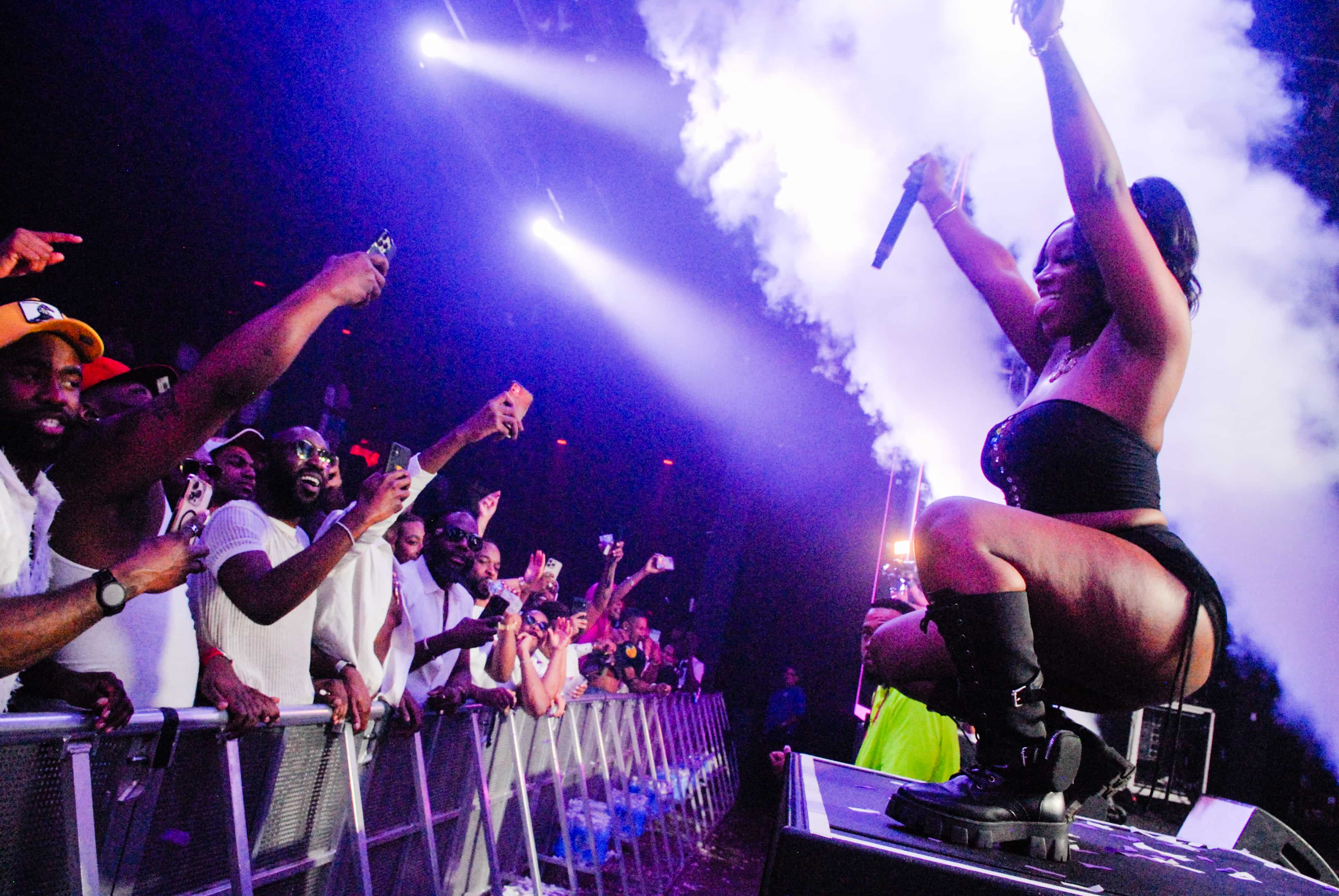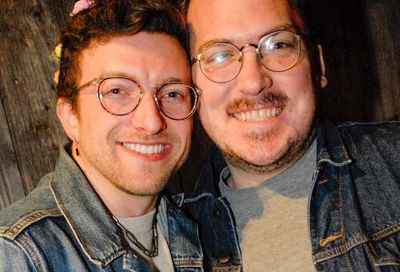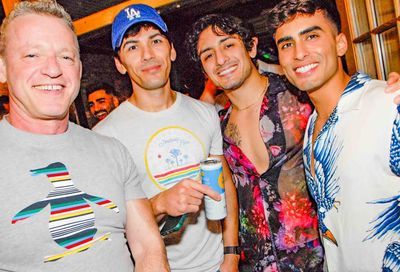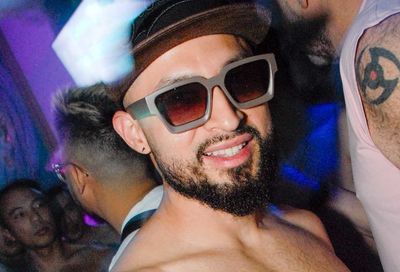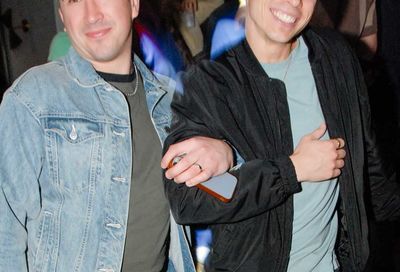Daryl Wilson Loves You
For two decades, the legendary party promoter has thrown the biggest, brightest parties associated with DC Black Pride. He just wants people to have the time of their lives.

Note to Tyson Beckford: Daryl Wilson wants his red sweater back.
In February 2006, Wilson was working with Washington’s now closed Edge/Wet nightclub to book a celebrity headliner for its Red Party. He pulled off a coup in snagging Beckford, who at the time was the spokesmodel for Ralph Lauren, and whose face and abs were plastered over billboards across America.
“No one really believed that Tyson Beckford was going to come to that party,” says Wilson. “I remember picking him up at the airport and walking through the airport going back to my car. I was like, ‘Okay, I’m with Tyson Beckford. What would the average gay guy be thinking right now?’
“When we got to the hotel, he was in his room getting changed, and he came out. He had no shirt on. He was like, ‘I don’t have anything red.’ I was looking at him, and I was like, ‘Holy shit.’ I literally took off my red sweater and gave it to him. He wore it at my party. I never got it back to this day.”
A major event promoter in the D.C. region, Wilson, himself a native Washingtonian, admits that party planning is something that comes naturally. It dates back to his childhood, when he organized impromptu barbecues with the other kids from his neighborhood in Southeast.
“I used to be the little kid on the block who would corral the kids together, and take my allowance money and go and buy a bunch of food and burgers,” he says. “I was grilling on a grill probably at the age of 15, making burgers and giving them to all the kids in the neighborhood, just having a good time.”
The youngest of nine, Wilson attended Cardozo Senior High School in Northwest Washington. Upon graduation, he worked in human resources at D.C. General Hospital for nearly two decades and then later served as an events coordinator for several major law firms. On weekends, Wilson and his partner would host parties for black gay men in their one-room apartment.
“I was working a full-time job, relationship, partner, and home, and all that stuff,” he says. “I wasn’t even thinking about the money or how I was going to be successful, or if this was going to be my career. It was just about having a good time in the community.”
Wilson’s house parties grew so popular that they outgrew his apartment. Working with the now-shuttered black gay nightclub Delta Elite, Wilson organized a weekly Saturday party that ran for nine years. He later launched Daryl Wilson Promotions, and started booking big-name talent for events, initially at Edge/Wet, and later branching out to other venues, including the Park at Fourteenth, where he currently hosts a weekly Sunday party.
Wilson, 50, is best known for his two decades of work with DC Black Pride, where his annual “Wet Dreamz Reloaded” array of events has introduced Pride participants to any number of unique and spacious party venues, including Nationals Stadium and the Walter E. Washington Convention Center.
On May 23, Wilson became the first party promoter to be honored by DC Black Pride with the Welmore Cook Award. Named for one of DC Black Pride’s co-founders, the award is presented each year to two people who have demonstrated “outstanding leadership.”
Earl Fowlkes, CEO of the Center for Black Equity, which organizes the annual Black Pride celebration, says Wilson has managed to succeed despite a drop in the number of promoters, a decrease in the number of LGBTQ bars, and a declining number of spaces specifically geared toward black LGBTQ people in the District.
“Over the years, as Black Pride has changed, and the promoter scene has changed, Daryl Wilson, despite economic changes and gentrification in D.C., manages to put out quality product on a regular basis, not just during Pride but throughout the year,” he says. “I have often times told people over the years that professionally, Daryl Wilson and I are in a relationship. We’re married to each other, and we actually need each other.
“Daryl’s been very generous to us, very willing to assist us, especially letting us use his space [this year], letting us have access to his people, without cost, and letting our sponsors have access to his people. he doesn’t ask for anything in return,” he continues. “We appreciate that, and we want to make certain that he knows we would not be where we are if it weren’t for the promoters, Daryl Wilson included. [People] keep saying he’s going to retire. I hope he doesn’t.”
METRO WEEKLY: Let’s talk about your first Black Pride. What was it like?
DARYL WILSON: It was like a family reunion, because it gave me an opportunity to spend a lot of time with dear friends as well as family. That was probably in May of ’93. It was more like a love fest more so than anything. They used to hold this huge outdoor festival on Sundays at Banneker Field. That was something like I’ve never seen before. Thousands of people off of Georgia Avenue near Howard University in this big open field, with a huge show, vendors and food. It was absolutely incredible.
MW: Is there a particular Black Pride that sticks out in your mind over the years?
WILSON: The most memorable pride for me was 2007. I did an event at Dream nightclub, which had just opened. I had Patti LaBelle there — her first time ever doing a pride event. I was honored that she said yes. Jennifer Hudson, who’s a personal friend of mine, actually came in and performed in that same show as well. She surprised Patti LaBelle, and sang “Happy Birthday” to her. That was really spectacular. I also had Remy Ma perform in that same show. So three artists in one night. There were thousands of people trying to get into the place. It was great.
MW: When you reflect back on past DC Black Prides, have you noticed a change in the community in terms of being more “out” or in terms of being more public about their sexuality?
WILSON: The younger generation is just more out today. They’re more out than my generation was. They’re more free, because they have more resources and cellphones and all that. A lot of the guys my age were not as much out. During the late ’80s, early ’90s, people were more prone to be in the background. They didn’t want to be seen. It was the stigma of being an African-American black gay man. That was already enough. You didn’t want anyone in your business.
My generation — we were that working generation of gay men. We had full-time jobs. We were partying hard on the weekend, but we were up early Monday morning at work. We had bills to pay. We never wanted to be out there in the public, and want everyone to know about our lifestyle. Today, things have changed. People are more outspoken. The awareness is out there. People really have a no-nonsense attitude about things. It’s not like we have to hide in the shadows anymore.

MW: Some critics wonder why it’s necessary to hold a separate pride event for the Black LGBTQ community. They feel that all the prides should be combined. What would you say to them?
WILSON: I think, for the Black community, we never really had something that we could say was “ours.” When Black Pride was birthed, it gave us an opportunity to say, “Hey, this is our culture. This is our moment. This is our time to build a legacy.” Now we have a piece of history. Something that will last forever. Even when I’m gone, there will always be this history of DC Black Pride.
MW: There was some friction a few years back between you and DC Black Pride. Can you address that?
WILSON: I wouldn’t say friction, I would say more of a misunderstanding. It happens in business. In this situation, you know, you deal with the situation and you just keep moving.
MW: What was the problem?
WILSON: It was more so I am a very outspoken person. I am very passionate about what I do. I think that sometimes gets misconstrued when people see how I do things. I think it was more so just a misunderstanding than anything. We just moved on.
I march to the beat of my own drum. I’ve never been one of those people who follows people. That’s never been my thing. I’m just a loner, so a lot of people don’t understand me. Some people have called me “shady.” Some people think I’m distant. I’m just a loner at heart. I’ve always been that way from a child. I’m always very open to having conversations with anyone, but at the end of the day, I always roll back into my little bubble.
MW: You’re describing yourself as an introvert, yet you’re a party promoter.
WILSON: Yeah, isn’t that weird? Here’s the thing. I went to a party several weeks ago. I normally don’t go to a lot of house parties. I’m a little older now. I’ll go to places here and there, and I’ll frequent Ziegfeld’s and Secrets, because I love to see a good ol’ cabaret drag show. I love to see the dancers. I’ll go to Town and I’ll go to Nellie’s. I’ll go to Bachelor’s Mill.
But when it’s over, I immediately roll back into that kind of secluded bubble. People think that I’m all [over] the world. I’m in every party, every cabaret, every function, but often, I’m really at home with my dogs.
Most people don’t know I’m really kind of a loner. I have a very small niche of friends I deal with. I love my friends dearly. I’m a Scorpio so I’m very loyal to my friends. I’m very loyal to everything in my life. I’m an old-fashioned little church boy, raised in a church, loved the church, very spiritual.
I don’t have kids. So I’m very protective about my dogs. I have three Pomeranians. Everyone who personally knows me, knows that my first dog, Cashmere, is my everything. That little dog has been in my life through every trial, tribulation, heartache, pain. He gives me everything I need. He’s like an angel. I just thank God for him all the time.
MW: Have you looked at Black Prides in other cities, and how do they compare to ours?
WILSON: For a long time, no one could compete with DC Black Pride, because it was the granddaddy of all Prides. After 15 or 16 years, it took a nosedive. Then you had all these other Prides, like Atlanta, that became very popular. Everybody thought it migrated and went to Atlanta. Even today, Atlanta still has a very good pride they host every year on Labor Day Weekend.
Then they started this new party called Sizzle Miami. People thought Sizzle was an actual Black Pride, but it wasn’t. It was a circuit party. So Sizzle Miami came in, and out of nowhere, put a huge dent into DC Pride’s numbers, because it’s held on the same weekend, Memorial Day Weekend. That has changed again. D.C. has now taken its rightful place back as the number one Black Pride in the world.
MW: What does D.C. do differently with Black Pride that makes people want to return year after year?
WILSON: I think it’s the events, the parties, the entertainment, the film festivals, the poetry slams, and a lot of the things that they do at the official host hotel. They have dance parties for the older generation. They have all different kinds of workshops and speed dating and all of those things take place inside the host hotel.
Sometimes I get aggravated, because a lot of the patrons that are coming here don’t really support those things, they don’t hear about it as much as they should. When people go to my website and ask about the activities, I immediately kind of push those things out there, because I don’t want people to come to DC Pride thinking it’s all about a party, because that’s not what DC Pride was built on. It was built about bringing the community together as a whole. The parties and all of the other stuff is just an added bonus to give you something to do at night, outside of the cultural events and the host hotel events.
MW: This year, you have straight male artists — Phresher, Safaree, Tank — appearing at your events. Do you think they understand and support the LGBTQ community, or are they just doing it for the money?
WILSON: I don’t think it’s about the dollar for them. Things have changed since the early ’90s. It’s now okay to go out and support the gay community. It’s now okay to say, “I’m a straight man and I have a gay friend and I can make it public.” It’s okay now for them to come in front of 3,000 gay men and lesbians and show their support, because at the end of the day, these 3,000 people that are here to see you are the same ones that have been buying your records for years, that have been keeping you relevant for years.
I think this is our time. This is our moment. This is our season to embrace them and bring them in, so that opens doors for more artists. My goal is to have Usher at Pride. My goal is to have Trey Songz and Bruno Mars. My goal is to go after these artists, and when Pride is over, I will be making phone calls to management companies, trying to get these other male artists to now do their part.
MW: Is there still reticence on the part of male artists or their handlers to be associated with an LGBTQ event?
WILSON: I think their handlers sometimes just don’t want them in that scene, because they feel like there will be backlash. I don’t think they understand that this is not 1990. This is 2017. It’s okay to be gay now. It’s okay for a young man to admit to his parents that, “Hey, mom, dad, I’m gay. This is who I am. Don’t try to change me.”
It’s okay now for these handlers or these management companies to now take the leash off of these artists and put them out there in the gay community, and put them out here at Prides. Once they do that, they will see that not only is it going to help that artist generate a huge fan base, but it’s also going to help their artist stay relevant and get other bookings at other Prides around the world.
MW: Has hip-hop as a genre been more embracing of the LGBTQ Black experience than, say, R&B?
WILSON: I would have to tread very lightly on that question, because I think the hip-hop community is still on unsettled ground. When you start talking about artists like Future and Drake, and all of these huge multimillion dollar artists, because their brand is so huge, I think the management companies — and I can’t speak directly for them, but I can speak to what I have observed — are still uneasy about them coming into those markets, because of whatever kind of backlash they may get.
I’m still waiting for these artists, especially some of the huge female artists that are in the industry that have these huge, huge gay followings. Like Beyoncé, her whole entire fan base is basically the gay community. What I don’t understand is why is she not performing at any Black Prides? I don’t understand, and I don’t know if it’s because of management, or if it’s just because of whatever. I think artists of her caliber, when you have a fan base as big as that, it should be on your books. I think management at these labels should have it on their books to support at least one Black Pride, if not two, a year. It’s imperative.

MW: How does it make you feel when you try to book an artist and it just doesn’t work out?
WILSON: For me, it’s just like, “Okay, well, moving on.” I don’t really waste time on being concerned about, “Oh, she’s not going to do it. He’s not going to do it.” Because at the end of the day, if you knock on enough locked doors, someone’s going to answer. I’m about making sure I have conversations and healthy relationship with people in the industry. Bringing someone like Tank and Safaree now opens the door for other male artists to now come in. I keep knocking. I’m going to knock until I get what I need.
MW: This year, for the Capital Pride Concert, the headliner is Miley Cyrus.
WILSON: Amazing.
MW: She’s made some comments about hip-hop she says were taken out of context, but were not well-received. Some people have also accused her of appropriating black culture through her dance moves in her videos. What’s your take?
WILSON: I don’t try to get caught up into the politics of any of this. At the end of the day, this is a business, whether it’s her business or her management’s business or my business or even your business. We’re all human and we all make mistakes — even me, even you. Nobody’s perfect. I think when you try to hold people’s feet in the fire until their feet just burn completely off, it’s just unfair. People say things that they really don’t mean. People do things that they don’t really mean. It depends on the circumstances and the situation.
When I saw the announcement that Miley Cyrus was coming to Capital Pride, I was floored, because I love Miley Cyrus. I don’t get caught up into the politics. I enjoy the artist.
MW: How do you feel about Tinashe and the Pointer Sisters coming as well?
WILSON: I have got to give a thumbs up to Capital Pride this year. I am just like, they have shit it this year. The Pointer Sisters? What can you say? You’re talking about a cultural movement. You’re talking about the Pointer Sisters. You have to align them with your Michael Jacksons, your Whitney Houstons, your Tina Turners, your Angela Bassetts, your Denzel Washingtons. Those women are a cultural movement in the black community, period. Let’s take out gay. For them to be on stage at Capital Pride, I don’t even know what to say.
MW: Some people commented after they announced it, “That’s the throwback artist,” an artist for the older attendees of Capital Pride.
WILSON: That’s how you have to look at it. I look at the club scene today and then I revert back to when I first came out in 1987 as a black gay man. There was no hip-hop. There was no rap. In the club, we had nothing but house music. The only thing we knew about rap during that time is when you turn on the radio and you heard Queen Latifah or you heard MC Lyte. Then you had your male rappers like LL Cool J and Kool Moe Dee and Kurtis Blow and all those. None of that was played in the club. Now, you have this whole new genre of hip-hop and rap just being played in the clubs and house music kind of sits on the sidelines. But I make sure that I have house music at all of my parties, every year, and have been from day one.
MW: Why is that?
WILSON: I think it’s important that we keep house music in clubs because that was one of the foundations of gay clubs, period. House music is how we set ourselves free, how we just let our hair down and have a good time and just have a wonderful time with your friends on the dance floor. The good old days.
You hear house music. You hear them bumping that bass, that hard bass, that drive. That’s when you can just take your shirt off and just party and just sweat. You’d go home and wake up and say, “What about last night? Oh, with the beats! The beats!” It was about the beats back then. A lot of the younger generation today, they don’t even understand. They can’t even imagine what the parties were like back then.
MW: How has the club experience changed, from your perspective?
WILSON: When you rewind the clock back to late ’80s and ’90s, especially in the black gay clubs, everybody partied together. The men and the women. I don’t care if you were transgender, if you were just one of those kids that nobody really wanted to hang around, or you were the misfit, or were not the cutest guy, or didn’t have the body, or had the body and didn’t have the face, or you were the pretty boy. It didn’t matter. No one cared. Everybody partied together.
Over the years, I don’t know what happened. I don’t know if it’s just the way that the promoters started marketing their parties in the communities, but you would have people that would put out fliers, “This party is for the boys,” “This party is for the body boys,” “No fems allowed,” “This party is for the tank top, the hot body contest.” If you don’t have a hot body, you can’t come.
For a young gay man, that could be almost like shunning them. It’s like you’re trying to fight gay with gay. You’re trying to separate a culture of people. You’re trying to pull them apart. I just think it’s so sad. I think that everybody should party and have a good time together.
That’s why for my parties, I want the women just as well as the men. I don’t care if you don’t have a hot body. You’re still welcome at Daryl Wilson’s party. I don’t care if you have an issue and no one loves you. Daryl Wilson loves you.
I’m not a promoter that you can’t come and talk to. I’ll talk to anybody. I can have a conversation with anyone. I meet a lot of young kids that come to me. They will say to me, “You said something to me years ago, and it stuck with me. I just want to say thank you.”
MW: What has been your biggest trial or tribulation in life?
WILSON: People not understanding who I am. A lot of people have this horrible misrepresentation of me. One of my dear friends who lived in Atlanta, I remember him saying to me one day, “I just really want to fight everybody, because they don’t know you. They don’t know you, the person that you are, how loving, how compassionate, how giving.”
I think people have a really bad misrepresentation of who I am as a person, because I’m just this person that lives in my own little world. I’m okay living in my bubble, with me and my three dogs and my boyfriend, in my own home, just doing my own thing.
I think people just don’t know me, so they’re very quick to judge me, not knowing that I’m just this little, big-lipped, D.C. boy from Southeast that’s just a gay man now, that I have a big heart, and I love people. I love to see people have a good time. I love to see people come together.
If you come to my parties, you never see me on the dance floor. You never see me turnt up. You never see me drinking. I’m sober. I’m watching everything. Every patron that comes through the door, I’m looking at how you are enjoying your experience at Daryl Wilson’s party. If you’re not, then I’m not doing what I’m supposed to do at the party. If your drink is not good, then I’m not doing my job as a promoter. People think they can’t approach me. You can approach me with a concern, an issue, and I’m very proactive about getting your problem solved right then and there. I care about people. I always have.
Daryl Wilson’s Wet Dreamz Reloaded 2017 is May 25th to May 29th. Weekend passes are available Thursday, May 25 at Stonefish Lounge, 1708 L St. NW, or Friday, May 26 at the Grand Hyatt Washington, 1000 H St. NW. For a complete schedule of Daryl’s Black Pride parties, visit darylwilsondc.com.
Support Metro Weekly’s Journalism
These are challenging times for news organizations. And yet it’s crucial we stay active and provide vital resources and information to both our local readers and the world. So won’t you please take a moment and consider supporting Metro Weekly with a membership? For as little as $5 a month, you can help ensure Metro Weekly magazine and MetroWeekly.com remain free, viable resources as we provide the best, most diverse, culturally-resonant LGBTQ coverage in both the D.C. region and around the world. Memberships come with exclusive perks and discounts, your own personal digital delivery of each week’s magazine (and an archive), access to our Member's Lounge when it launches this fall, and exclusive members-only items like Metro Weekly Membership Mugs and Tote Bags! Check out all our membership levels here and please join us today!






